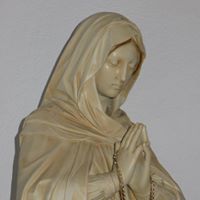 Who is this who comes forth like the dawn, as beautiful as the moon, as resplendent as the sun,
Who is this who comes forth like the dawn, as beautiful as the moon, as resplendent as the sun,
as awe-inspiring as bannered troops? (SS 6:10)
Saint Francis de Sales calls Mary our “captainess” in the battle for virtue and against the world, the flesh, and our own self-will. In his sermon of September 10, 1620, Saint Francis sketches Mary’s credentials for assuming her leadership role: first, the eminent graces given to her as Mother of God ( conceived without sin and with the use of reason); second, her experience in all the states and stages of the spiritual life; and third, her imitable example for we who are still struggling here below.
“In the beginning of her life,” St. Francis preaches, “she was subject to her mother. She remained with her family to show girls and children the honor and subjection they owe their parents… Then she married, to be a mirror for the married, and finally a widow. Thus Divine Providence let her pass through all the states of life in order that all creatures might find in her, as in a sea of grace, what they need in order to form and adapt themselves to their state in life.” To teach us to battle against the world (honors, dignity, fame), Mary enters life a baby and it is in the cradle that she makes this first renunciation of the world. “Come close to her cradle,” Francis invitees us, “think of the virtues of this holy infant… Question the angels, the cherubim and seraphim, ask them if they are equal in perfection to this little girl, and they will tell you that she infinitely surpasses them.” Amid the praises of angels, Mary abases herself, and appears as any other child though in light of her divine favors, she was unlike any other child. No one suspected her gifts and graces. Such was her total renunciation of the world.
Our second enemy is the flesh “which we carry about with us always, and whether we drink, eat or sleep, this flesh always accompanies us and tries to deceive us… and so the continual renunciation of it is certainly most difficult.” Again, it was from infancy that Mary made this renunciation, for like all babies, she must follow the regimen of her mother, and she did this voluntarily – for, as Saint Francis tells us, she certainly had the gift of reason.
The third, and most difficult battle is against our self-will. “We can sometimes reach the perfection of the other two but where there is question of leaving oneself, that is to say, our own spirit, our own soul, our own judgment – even the good things which seem to us better than what has been ordered us, in order to subject ourselves in everything to the guidance of another, here is where there is a question of giving up something that is good…” This death to self, the ultimate goal of religious life, and intrinsic to allowing Christ to live in us by substituting his will for ours, is a life-long process. For Mary, the process was life-long and full of victories. From the time of her nativity, in every circumstance, Mary never used her liberty to oppose the will of God. “Consider well the whole course of her life and you will see nothing but continual subjection. She went to the Temple, but it was her parents who brought her there… Shortly after, they gave her in marriage. See her leaving Nazareth to go to Bethlehem, her flight into Egypt, her return to Nazareth. In short, you will only see in all her comings and goings only an admirable subjection and docility. She went so far as to see her Son and her God die on the wood of the Cross, remaining firm and standing at the foot of it, submitting herself to the Divine decree by adhering to the will of the Eternal Father. Not by compulsion, but of her own free will…” Standing beneath the Cross with holy Mary, may we, too, learn to choose God’s will over our own.
